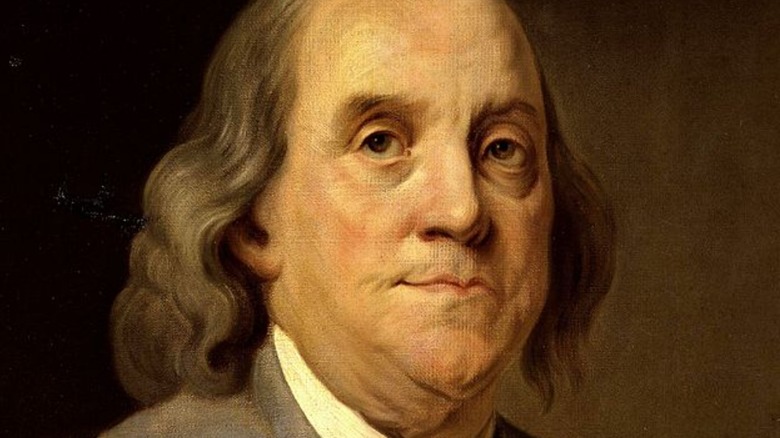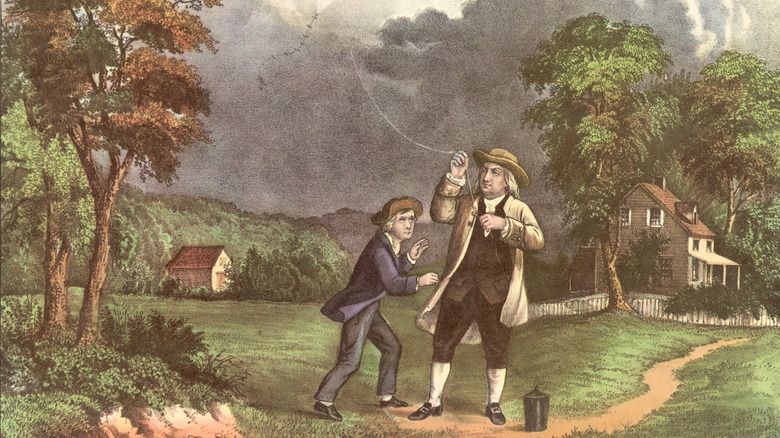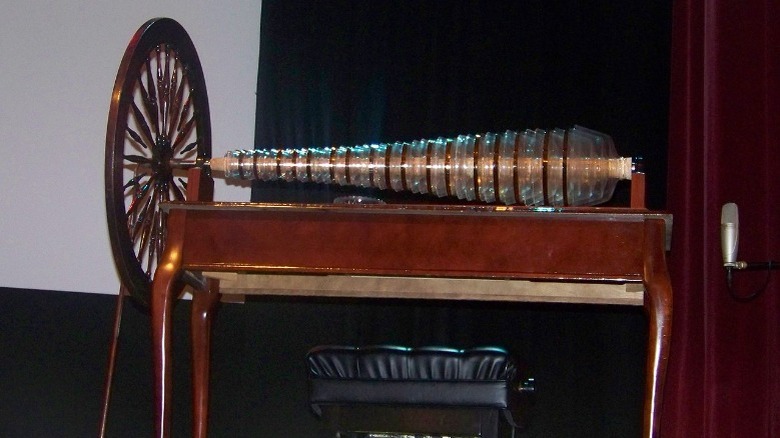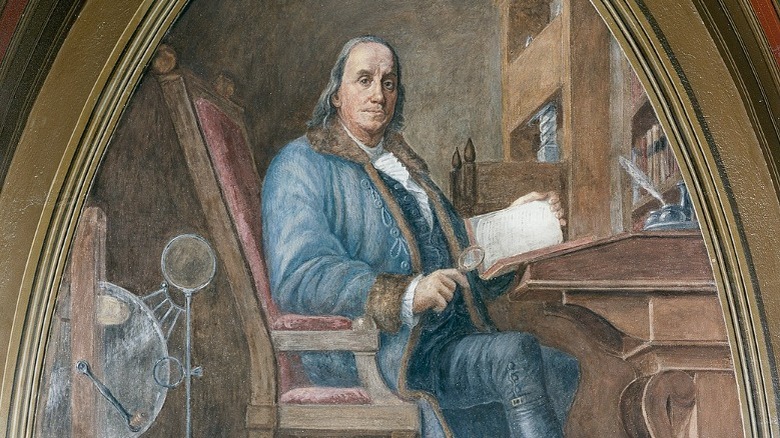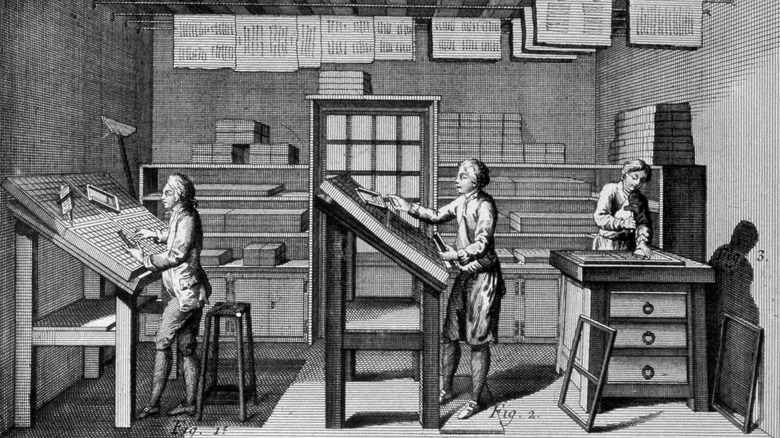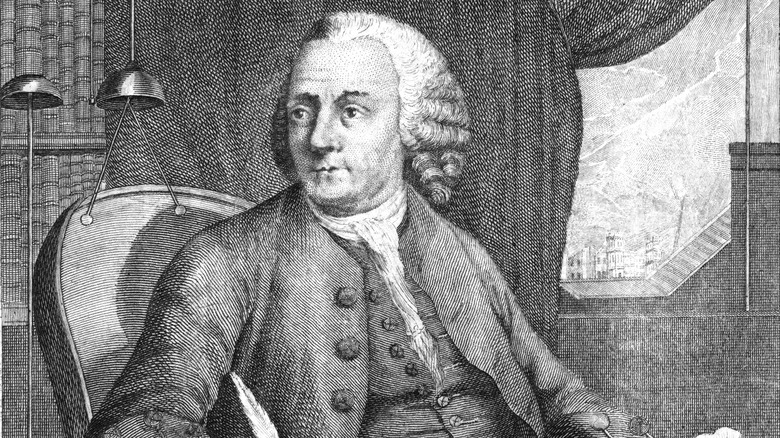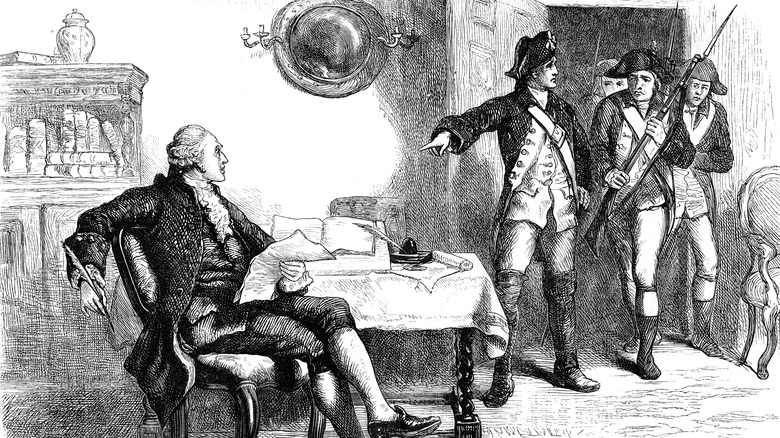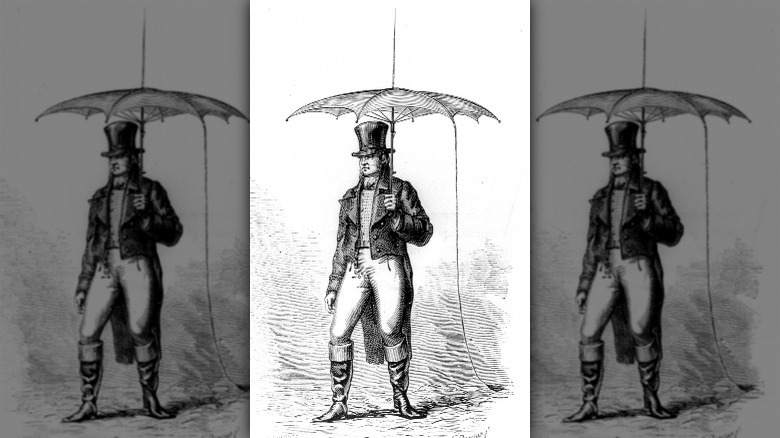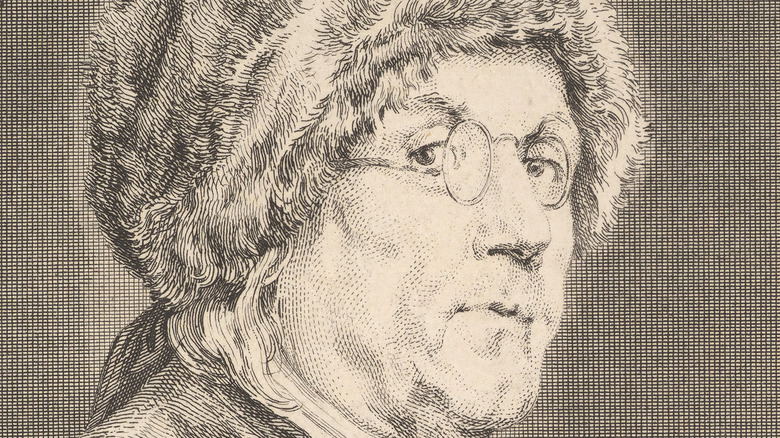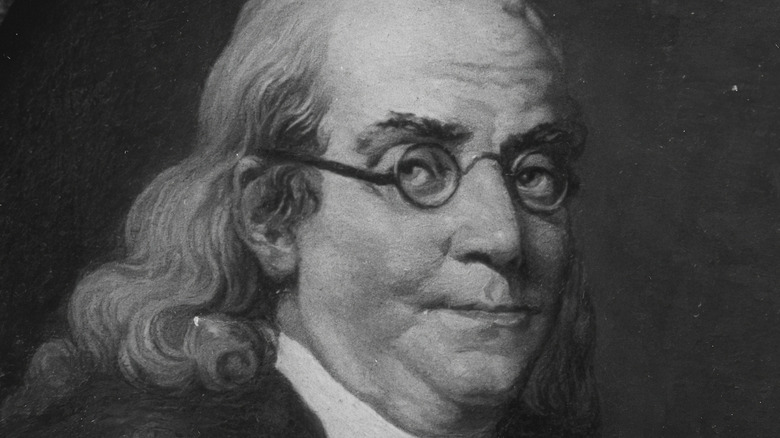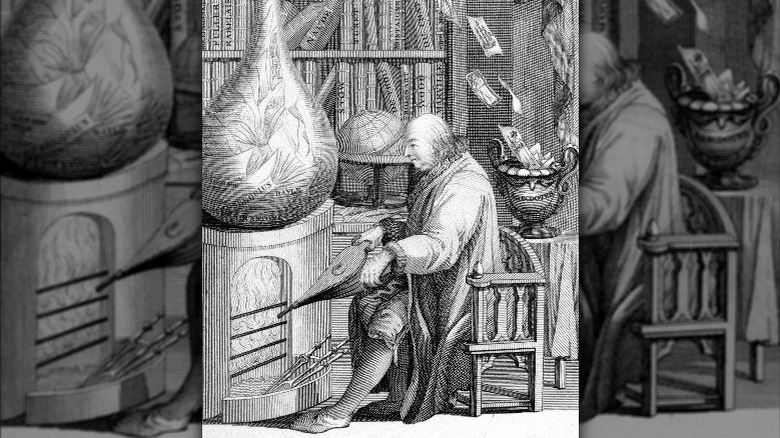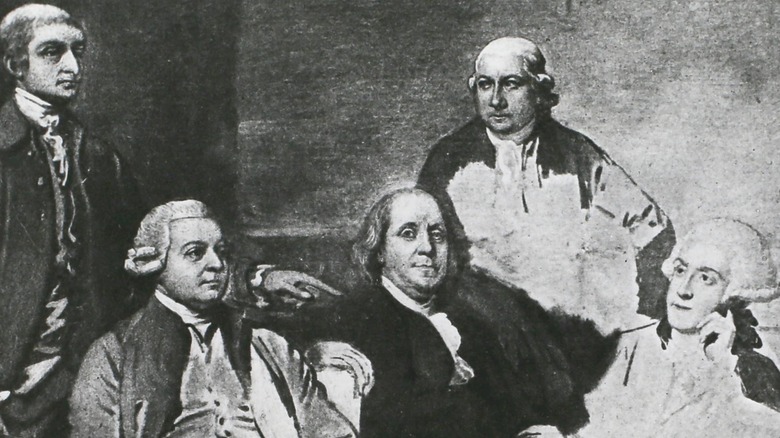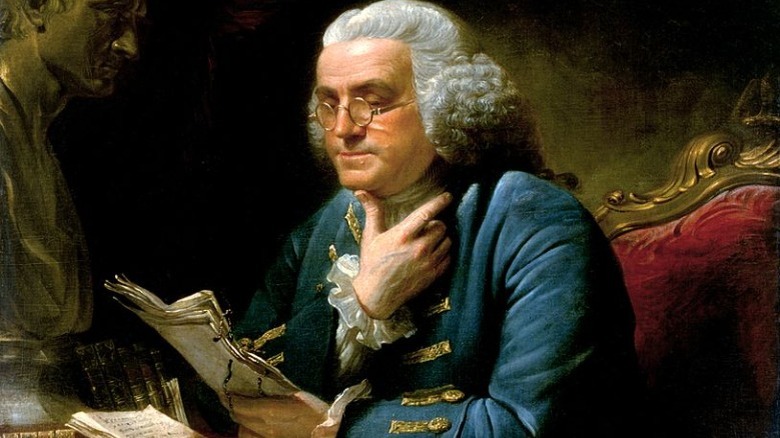The Untold Truth Of Benjamin Franklin
Benjamin Franklin was one of the most influential men of his era, and might even be considered the United States of America's first celebrity. As the oldest of the "Founding Fathers," Franklin is best remembered today for his role in the Revolutionary War and the nation's founding. As described by documentarian Ken Burns, in his own time, he was renowned as a scientist, inventor, diplomat, and writer.
In addition to helping create the policies that would become the basis for the United States government, Franklin had a staggering number of vocations and hobbies. As noted by Smithsonian, during the war, Franklin served as a diplomat in France — which many have credited as securing American independence. He was a chess champion and was posthumously inducted into the Chess Hall of Fame. He was an exceptional swimmer (and particularly liked to swim naked, according to Swimming World Magazine). He was America's first Postmaster General and the owner of a thriving publishing empire. Benjamin Franklin was a complex man whose life, both professional and private, has been fascinating the public for centuries.
Benjamin Franklin was a scientist
The possibly apocryphal image of the oldest Founding Father standing outside flying a kite in the middle of a thunderstorm to study electricity has captured public imagination, but it was far from his only experiment. While most often remembered today for his contributions to the Revolutionary War and the early American government, in his own lifetime, Benjamin Franklin had a prestigious reputation as a scientist. As stated in the Library of Congress, his contributions to multiple fields of science earned him international acclaim.
As described by the National Parks Service, Franklin was an important scientist in his era. His experiments with electricity went beyond electrifying a key on a kite. He was the first to use the now-common terms "positive and negative charge" and "battery." He was involved in astronomy, publishing the observations of his fellow scientists on the transit of Venus, which they used to determine the distance between the Earth and the sun. He studied the paths of storms, ocean currents, and volcanic winds, and brought experts in botany together from around the world to learn more about agriculture.
He was an inventor
Benjamin Franklin didn't only study natural phenomena, he also used his knowledge to invent new solutions to common problems. Franklin studied lightning, confirming his hypothesis that it was electricity, and he devised a way to prevent dangerous lightning strikes. As described by The Franklin Institute, Franklin came up with a design for an eight-foot iron rod that would draw the lightning to them, protecting people and buildings from damage. He is also credited with the idea for "bifocals," or glasses that have a corrective lens for distance vision at the top and a different corrective lens for close-up vision at the bottom. He invented a type of stove, eventually known as the Franklin stove, which was more effective at heating rooms than a typical fireplace and released less smoke into the home. After learning about his brother's struggles with frequent kidney stones, he designed a flexible catheter that made treatments more bearable.
As noted by the Guardian, one of his most popular inventions was a musical instrument called the glass harmonica. The instrument, which resembles 37 interlocking glass bowls and is played by spinning, was used by famous composers like Mozart and Beethoven. While it isn't as well-known today, modern artists from Bjork to Tom Waits have used the instrument in their music.
As noted by The Franklin Institute, his inventions were extremely popular, but he never patented a single one, because he wanted them to be "shared freely."
Benjamin Franklin was mostly self-taught
While Benjamin Franklin would receive honorary degrees from Harvard, Yale, William & Mary College, the University of St. Andrews, and Oxford University (per NPS), he only received two years of formal education.
While Franklin had to drop out of school as a child, he never gave up on his studies. As described by History, Franklin was working for family members (first making candles and soap and later apprenticing at his brother's newspaper) before he turned 13. Franklin saved any money he earned for books, and was known to completely memorize favorite articles and essays.
He would go on to make important contributions to science and be renowned as a writer and politician. As quoted by NPR, Franklin stated that the one subject he truly struggled with was mathematics – but modern experts have stated that the understanding of numbers he gained from his personal studies was actually fairly advanced, and that his political and business writings both show an understanding of statistics that was uncommon in his day.
He secretly wrote articles as a teenager
Before Benjamin Franklin was a respected writer, his brother James ran his own print shop. At the age of 12, Franklin was apprenticed there, learning the complex trade of printing. He knew his older brother would never allow him to publish his own writing – at least not if he knew that his brother had written it. As described by Thirteen, young Ben Franklin adopted a pen name.
Franklin's brother James had begun publishing a weekly newspaper, "The New England Courant." The paper was provocative and controversial, publishing stories critical of respected authorities. By 16, the young Ben Franklin had been ambitiously practicing his writing on his own time and was eager to put it out into the world, so he adopted a pen name – Mrs. Silence Dogood. Through this imaginary character, Franklin wrote his own poetry, sharp advice, and witty social commentary. He advocated education for women, pointed out the dangers of "hypocritical pretenders to religion," and mocked the education of the wealthy elite.
As noted by the 1938 biography "Benjamin Franklin," after the real author of the Dogood articles came out, James became increasingly uncomfortable with his younger brother being his apprentice. The articles had been widely praised, and James thought it had gone to his head. Benjamin Franklin left his apprenticeship early, making it difficult for him to find a new job and causing a rift in the family.
Benjamin Franklin had loved England
While Benjamin Franklin is today most famous as a fierce advocate for American independence from England, for most of his life, he had been a loyal British subject.
As described by George Goodwin for Smithsonian, when Franklin was 18, he worked in a print shop in London and remained there for two years. During this time, the self-taught young man became a part of a thriving London intellectual community. He met some of the most prestigious scientists and authors of the age, which prepared him to build a profitable printing empire back in Philadelphia and for his future as a diplomat.
Throughout his life. Franklin often lived in England. He had a home in London, where he spent much of his time. It was there that he became involved in politics, working on several colonial assemblies, and arguing against higher taxes. He was in his late sixties before he moved back to Philadelphia for good – and only then because his feud with certain powerful members of the government had escalated, and he was likely to be arrested.
The revolution tore his family apart
Benjamin Franklin was almost 70 years old when he became a member of the Second Continental Congress. Uncharacteristically, at first, he kept his opinions to himself. As noted by Smithsonian, knowing that Franklin was usually so outspoken, some came to suspect that he was secretly loyal to England, or was even a spy for the Crown. The truth was that before publicly voting for independence, Franklin hoped to convince someone else – his son.
As described by historian Daniel Mark Epstein, Franklin had an incredibly close relationship with his son William. William was illegitimate, but Franklin legally adopted him, raised him, and educated him himself so that they could work together. William eventually became the Royal Governor of New Jersey. While his father, Benjamin Franklin, would go on to become one of the most important figures in the Revolutionary War, William remained loyal to England.
In October of 1775, the father and son argued bitterly about what the future of the American colonies should be. Neither could persuade the other. The following year, William was imprisoned on the orders of the Continental Congress. Franklin never argued against the decision, and while he sent some money to his daughter-in-law while William was in prison, he refused her urging to find a way to have his son released. A full decade later, after the war was over, the father and son met briefly. After that, they never spoke again.
Benjamin Franklin was a trendsetter
After the Declaration of Independence in 1776, Benjamin Franklin traveled to France as an ambassador. His tremendous popularity there would turn the tide of the war. To have a chance at defeating the British, however, the Continental Congress knew that they would require the support of a powerful and established nation. As described by the Office of the Historian, France had lost North American territory to the British a little over a decade before, and in the early 1770s had been secretly assisting the colonies in their struggle with England. Benjamin Franklin traveled to France in hopes of securing that alliance.
Franklin became something of a celebrity in France. As described by NPR, Franklin played up the image that the French had of Americans as rugged frontiersmen, even wearing a raccoon fur hat with a long tail. Soon all things Benjamin Franklin were in fashion. As noted in "Stealing God's Thunder," there was even a brief fad for lightning rod-themed hats and accessories inspired by Franklin's famous invention.
France would go on to provide the Continental Army with weapons and uniforms and support the American cause with troops and their superior navy.
He traded tobacco for an army
Benjamin Franklin had spent much of his life living in England and traveling in Europe, and he had some knowledge of French culture. He started numerous trends in France during his time as a diplomat – but none as popular as snuff. Franklin was able to turn a national addiction into an advantage.
As described by Salon, snuff was tobacco that was ground into a fine powder and inhaled. It had become a favorite habit of the French aristocracy. France had no colonies that grew tobacco, so the only way to procure snuff was from England, which charged them a significant markup. Franklin and others within the Continental Congress were well aware of this, and the year before declaring independence, they announced that they would be willing to trade with other nations. If France was to get their snuff directly from the American colonies where it was grown, they could get it at a much lower price without relying on their historical enemy England. If the colonists lost the war and remained a British colony, however, they could no longer trade directly with France.
There was a tradition of the French giving diplomats elaborate snuff boxes. As described by journalist Allen McDuffy, when Franklin left France, the king presented him with a snuff box with over 400 diamonds. It was so elaborate that Franklin was worried that accepting it would make him appear corrupt – but he brought it home anyway.
Benjamin Franklin had an exciting sex life
Benjamin Franklin was enormously popular in Paris, particularly with women. He was in his 70s when he was in France working towards an alliance, but that didn't stop him from getting a flirtatious reputation. According to Time, among Parisian women, Franklin was nicknamed "Cher Papa" – which roughly translates to "darling daddy." Some have argued that Ben Franklin's romantic success with women in France aided him in securing the military alliance.
As described by Biography, Franklin's love life had always been chaotic. When he was young, he had an illegitimate son, attempted to seduce a friend's mistress, and described being pulled "frequently into intrigues with low women." In 1745, he famously wrote a long letter advising young men to choose older women as lovers. Among his reasons was that he believed they would have more experiences and knowledge, making them better conversationalists and sexual partners.
As described by History, some historians believe he may even have been a member of a secret society known as the Hellfire Club. It is believed that the Hellfire Club may have met for elicit parties in underground tunnels under the manor of Sir Frances Dashwood, one of Franklin's close friends.
He challenged common conventions
Benjamin Franklin was famous for doing things his own way. As one of the "Founding Fathers," Franklin is known for envisioning a future for the American colonies as their own nation. Throughout his life, Franklin was an innovator who wasn't afraid to challenge common conventions, big and small.
Franklin rejected some commonly held superstitions that weren't backed up by science. As recounted in "Life and Times of Benjamin Franklin," on one strange occasion, Franklin and fellow founding father John Adams could not secure enough rooms at taverns and inns for both of them, and were forced to share a bed. According to Adams, he wanted to keep the window shut because he feared the night air would make him sick. While strange to modern people, this was an extremely commonly held belief at the time (per Wired.) Franklin refused to shut the window, however, and told Adams all about his "theory of colds." Franklin talked so long that Adams fell asleep during the explanation.
Franklin wasn't content just to write and print in English – he felt he could improve the alphabet. As described by Smithsonian, he created an alternative, phonetic alphabet, which didn't include the letters C,J,Q,W,X or Y.
He was (mostly) a deist
Science and rationality flourished in this period of history, and Deism was increasingly popular in 18th century America. As defined by Britannica, deists believed that the universe was created by a god, but that since then, deities had no impact on what happened in the world. This was how Benjamin Franklin described himself – but some historians have argued that his faith was more complex.
As described by The Washington Post, Franklin was raised in a strict Puritan household, but as a teenager, he came to doubt the faith that he had been raised in. At some points in his life he was opposed to Christianity, but as he grew older, he came to view the religion as positive overall because of the morality that he felt it promoted. It is believed that Franklin didn't personally believe in most fundamental parts of the Christian faith, but that he appreciated its emphasis on kindness and charity.
When Franklin was 81, he had a surprising request for the Constitutional Congress – that they open with a prayer. At the time, he argued that with more experience and age, he saw that God was intervening in human affairs. Whether that was his genuine belief or was simply hoping to inspire more morality into Congress is unknown.
Ben Franklin changed his mind about slavery
Benjamin Franklin continued to change and evolve throughout his long life. Like many of the Founding Fathers, including George Washington and Thomas Jefferson, Franklin legally owned enslaved Black people. Unlike many others, Franklin realized what he was doing was morally wrong.
As described by The Advocate, several enslaved men worked at Franklin's printer. Franklin was involved in multiple charities, including one that helped create schools for Black children in the United States. In 1763, the 57-year-old visited one of the schools that he had helped establish. He wrote that the children he saw learning there were "in every respect equal to ... white children." This view was extremely radical for the time. There were white abolitionists, but many of them still believed that white people were in some way inherently superior. Franklin argued that any apparent differences came from the horrendous treatment that Black Americans had been subjected to.
Franklin freed the enslaved people who had been working at the printer shortly after. Franklin became more and more vocal about his opposition to slavery, referring to it as a disgrace to the nation he had helped to create. At the age of 84, he petitioned Congress, stating that everyone in the United States should enjoy "the blessings of liberty ... without distinction of color." Franklin's final written work before his death was a fiery anti-slavery essay, parodying the arguments made by proponents of the institution he had come to recognize as "constant butchery of the human species."
